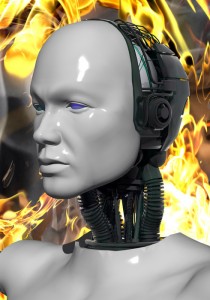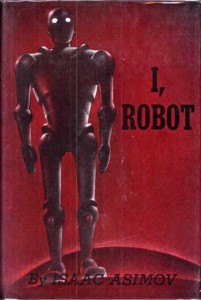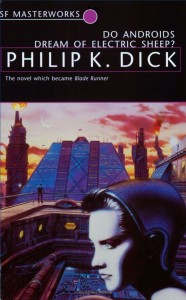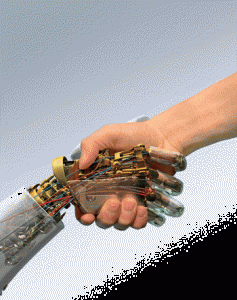 I recently came across a great source for research and reflection in Robert Geraci’s work. Geraci teaches at Manhattan College in Religious Studies. The college website describes his research and teaching interests, including the power of religion in contemporary culture, particularly with regard to the interaction between religion and technology. His past research focused upon the relationship between artificial intelligence (AI), robotics and religion (primarily Jewish and Christian apocalypticism but also Japanese Buddhism and Shinto). He is the author of a number of interesting journal articles, and the new volume Apocalyptic AI: Visions of Heaven in Robotics, Artificial Intelligence, and Virtual Reality (Oxford University Press, 2010).
I recently came across a great source for research and reflection in Robert Geraci’s work. Geraci teaches at Manhattan College in Religious Studies. The college website describes his research and teaching interests, including the power of religion in contemporary culture, particularly with regard to the interaction between religion and technology. His past research focused upon the relationship between artificial intelligence (AI), robotics and religion (primarily Jewish and Christian apocalypticism but also Japanese Buddhism and Shinto). He is the author of a number of interesting journal articles, and the new volume Apocalyptic AI: Visions of Heaven in Robotics, Artificial Intelligence, and Virtual Reality (Oxford University Press, 2010).
Geraci’s research interests overlap with my own, and his article “Robots and the Sacred in Science and Science Fiction: Theological Implications of Artificial Intelligence” in Zygon: Journal of Religion and Science 42:4 (December 2007), brings together a number of areas that dovetail with the foci of TheoFantastique. Geraci graciously provided some thoughts about robotics, artificial intelligence, science, and science fiction in the following interview.
TheoFantastique: Robert, thanks for your willingness to discuss your thoughts on robots, AI, and science fiction. You have written quite a bit on these topics. Why is this an area of great research interest for you, and how did you develop this research project?
Robert Geraci: A lot of it was simply good fortune. As I approached the dissertation writing stage of my PhD, I wanted to write on religion, science, and art. So I chose a religion I knew a reasonable amount about (Christianity) and a science that I figured would be fun to learn more about (robotics), and a couple of contemporary artists (Survival Research Labs and Wolfgang Laib, who do very different work from one another). The general pop chic of robotics made it look good to me and a cursory look at pop science in robotics and AI revealed clear religious systems. So once I got going there was no question that I was onto an interesting subject.
 TheoFantastique: In your article for Zygon journal you connect Rudolf Otto’s description of the human encounter with the divine in his book The Idea of the Holy and note how this is similar to human reactions to intelligent machines. Can you summarize Otto’s thinking here (which scholars have also observed is similar to human responses to horror), and how this connects to our reactions to robotics in certain contexts?
TheoFantastique: In your article for Zygon journal you connect Rudolf Otto’s description of the human encounter with the divine in his book The Idea of the Holy and note how this is similar to human reactions to intelligent machines. Can you summarize Otto’s thinking here (which scholars have also observed is similar to human responses to horror), and how this connects to our reactions to robotics in certain contexts?
Robert Geraci: Otto believed that experiencing god (he was a Lutheran theologian) involved two elements: the mysterium tremendum and the fascinans. The former represents (in short) the fact that god is “wholly other” (mysterious to us) and enormously powerful; as other and as a source of overwhelming power, god is fearsome. The fascinans reflects the allure that god has; god is the source of love and of salvation, therefore we are drawn to it.
In science fiction, robots and highly intelligent computers often inspire the same feelings from human beings. In essence, robots nearly always threaten humanity in some fashion while always being necessary in some other function. Sometimes machines threaten human jobs, sometimes they threaten to take over the world or enslave humanity, sometimes machines have less malign intent but nevertheless diminish humanity by their presence. At the same time, there are inevitably things which can be accomplished only with the help of the machines; without them, the human characters would be destined to defeat at the hands of their enemies or even as a result of their own folly. The robots thus lead people to feelings of both fear and fascination.
TheoFantastique: Can you provide some examples from science fiction film and literature that supports this idea of a “sacred response” to robotics and artificial intelligence?
 Robert Geraci: There is a pretty wide variety of examples, so I’ll just mention a few. Asimov’s Machines are computers that rule the world, diminishing human beings to mere instrumentality but also offering a peaceful and effective society. His robots threaten economic and social disenfranchisement but are clearly necessary for the future of humanity, which appears to be degenerating in Earthly society. In Dick’s Do Androids Dream of Electric Sheep?, the androids are dangerous murderers but also necessary to enable human migration from their war-torn home planet. As the Terminator films and Matrix films progress through the series, the machines who threaten to kill or enslave all of humanity are necessary in the human struggle against other machines. The perfect example of this is when Arnold Schwartzenegger’s T-800 navigates the shopping mall in Terminator 2, scaring the young John Connor only to actually save Connor from the new T-1000 model. Another good one is Robby the robot from Forbidden Planet. The Krel technology in Forbidden Planet is lethal to the film’s characters but they cannot leave Altair IV without Robby, who is himself representative of the dangerous technology that killed all of the Krel and nearly the movie’s protagonists as well.
Robert Geraci: There is a pretty wide variety of examples, so I’ll just mention a few. Asimov’s Machines are computers that rule the world, diminishing human beings to mere instrumentality but also offering a peaceful and effective society. His robots threaten economic and social disenfranchisement but are clearly necessary for the future of humanity, which appears to be degenerating in Earthly society. In Dick’s Do Androids Dream of Electric Sheep?, the androids are dangerous murderers but also necessary to enable human migration from their war-torn home planet. As the Terminator films and Matrix films progress through the series, the machines who threaten to kill or enslave all of humanity are necessary in the human struggle against other machines. The perfect example of this is when Arnold Schwartzenegger’s T-800 navigates the shopping mall in Terminator 2, scaring the young John Connor only to actually save Connor from the new T-1000 model. Another good one is Robby the robot from Forbidden Planet. The Krel technology in Forbidden Planet is lethal to the film’s characters but they cannot leave Altair IV without Robby, who is himself representative of the dangerous technology that killed all of the Krel and nearly the movie’s protagonists as well.
TheoFantastique: How is science fiction a serious and important consideration for scholars of science and religion?
Robert Geraci: That’s a great question and I hope more students and scholars will include science fiction in their research portfolios. Not only does sci-fi reveal many important aspects of human psychology but it is the pre-eminent place for thinking about how human beings relate to technology. Where else is the human experience of technology among the foremost concerns? That there are religious ways of thinking about technology in sci-fi shows that there are religious ways of thinking about technology. While that seems like a tautology, somehow we still have cultural prejudices about sci-fi that interfere with using such books, films, comics, etc. as serious research material. The ways in which sci-fi provides religious incentives, advocates particular religious systems (such as transhumanism, in some 21st century literature), and reveals particular social attitudes about technology makes it really important. No one questions the importance of Victorian literature for understanding 19th century English attitudes yet somehow sci-fi is popularly assumed to be a genre for little boys only. Science fiction is quite frequently very sophisticated and reflects the interests of a wide segment of our culture.
 TheoFantastique: In your view, what are the implications of your thesis regarding intelligent machines and the sacred for traditional Christian theologies?
TheoFantastique: In your view, what are the implications of your thesis regarding intelligent machines and the sacred for traditional Christian theologies?
Robert Geraci: First, I think it reveals that in general people frequently have a religious approach to technology, which is a claim that a lot of people would want to deny (I think).
Second, the easy way that sacred categories are applied to robotic technology creates challenges to traditional theologies, which must find ways of engaging individuals who experience something sacred in their engagement with machines. For example, the folks who wish to upload their minds into virtual reality are theological competition for Christianity, etc. in today’s “spiritual marketplace.” I have a paper forthcoming, for example, that addresses how some science fiction books are evangelism for transhumanist religious thinking.
Third, I think it shows how religious practices and beliefs permeate the rest of our cultural production. In our secular culture, we have not abandoned religion; we’ve seen two religious threads emerge. There are powerful movements to preserve traditional religion (such as in fundamentalist circles in the U.S.) and there are religious ideas that escape their old confines and mesh with the profane. That machines might offer salvation (rather than god doing so) reveals the distribution of sacred categories throughout our culture.
TheoFantastique: Robert, thanks again for your research and your discussion of it in this forum.
Robert Geraci: Thank you for the invitation to talk about this! I appreciate your interest.





Hi John, I enjoyed this interview.
I appreciate that this was posted a while back, but may I ask you (it’s directed at Robert but he may or may not be able to answer it given that it was a while ago. So I’d appreciate your thoughts if you can). The question is regarding the theory that the way we will address intelligent beings ( in this case, Cog) is akin to the numinous . Could you (if you have the time) elaborate briefly on the implication that this has for a relational view of the image of God. From what I understood – in the context of Foerst’s relational concept of the image of God & man – it does not hold that we build the robots as ‘man’ (as God has created us) to simply co exist and share in our creation. Rather our reaction show that we build the beings to be divine; hence “we are to God as we are to A.I.” I don’t believe I fully understand and think I may have misinterpreted this. I would appreciate it if you could illuminate on this.
HAL2D
hello HAL2D,
john kindly forwarded this message on to me, and i’m happy to engage it briefly.
foerst’s position is that we can relate to machines as we do to people, because god made people as relational beings. she argues that machines could be treated as persons and, indeed, could genuinely be persons (religious persons, even). i am fundamentally in sympathy with this position, though i am agnostic on gods. i do believe that machines–at least in theory, though perhaps they will not in practice–could develop personhood and, if so, that they would likely develop religious beliefs.
the position i was articulating about SF, however, is a different one. i was showing how in SF machines are treated in ways that mirror what otto called the holy or the numinous. that says more about our speculative lives than it does about our practical lives. the book that prompted this interview, engages both of those things (including foerst’s approach), as it explores the implications and distribution of beliefs about transcendently-intelligent machines and mind uploading.
i hope that helped a bit!
Thank you so much Robert for the explanation. Can I ask your permission to cite your post for educational purposes. The book you are referring to is Apocalyptic AI…? I’ve read it and found it very helpful.
And thanks to John for forwarding the email.
hi HAL2D,
since i’ve gone and put the words out on the interwebz, you’re welcome to cite them. 🙂
regards,
robert